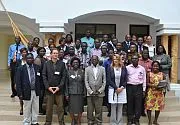Future Infections: Linking social-ecological transformation and arthropod-borne infections – part of the SFB 228 Future Rural Africa
- Keywords
-
Future making, arboviral diseases, vector ecology and biology
- Countries
-
Kenya, Namibia
- Summary
-
Conservation and intensification are two important pathways of large-scale land-use change in rural Africa. Besides anticipated effects, these top-down strategies of future-making may have unintended side effects on human and animal well-being, in particular because of so- called emerging infectious diseases (EIDs). These pose a serious threat to global health, with more than 70% of them being zoonotic, and among the latter a significant number are arthropod-borne viruses, so-called arboviruses. Arboviruses are particularly sensitive to ecological changes and can easily escape from their natural transmission cycles and adapt to new hosts and geographic regions. Most prominent examples are the epidemics caused by yellow fever, Dengue, Chikungunya and Zika viruses in humans and Rift Valley fever (RVF) in both humans and animals. Land-use changes can have profound effects on biodiversity and EIDs. However, functional linkages between biodiversity and viral pathogens are poorly understood. Moreover, land-use, climatic and demographic changes and rapidly developing livestock markets with concurrent social transformations have a tremendous impact on the livestock sector, in particular on traditional forms of pastoralism in Africa. One of the consequences of these transformations are changing livestock migration routes, which can foster the spread of arboviruses. Yet the impact of ongoing socio-ecological trans- formations in rural Africa on arbovirus transmission cycles remains elusive. This project aims to understand how ecosystem diversity influences vector and virus populations in the light of large-scale land-use changes in rural Africa. Effects of conservation and agricultural intensification (with a particular focus on invasive plant species) on selected arboviruses will be studied in the KAZA and the KRV sites. We will analyze major ecosystem characteristics and assess vector diversity and concomitant arbovirus infections at sites with different duration of land-use changes, the latter especially in KAZA. To identify if simple proxies of diversity can predict patterns of arbovirus abundance or prevalence, we will quantify the taxonomic diversity of vectors, hosts and vegetation. The latter could be important, as there are indications that some vector species favor certain invasive plants. Thus, this project will attempt to quantify the proportion of selected invasive plants, initially in the KRV site, and analyze the impact on vector dynamics and arbovirus prevalence. Close collaboration with projects studying agricultural futures (A03) and conservation areas (A04), ecosystem diversity and services (A01), the challenges of invasive species (B01), and the economic and energy transformations (C02) to name a few will enable a broad and long-term understanding on how such socio-ecological changes will affect arboviral diseases at the KAZA and KRV sites. Regarding the bridging concepts of the collaborative research cluster (CRC), our research will investigate how socio-ecological transformations and land-use changes in the context of future making will lead to shifting boundaries of EIDs and the vectors that are responsible for their transmission. Long-term studies within the framework of the CRC will enable us to understand the dynamics of vector-born infectious diseases and how they affect and potentially disrupt future-making across Africa.
- Methodology
-
The project partners will also aim to develop viable insect rearing and harvesting techniques, assess the nutritional attributes of the insects (while taking into account the unique needs of women, girls and infants), identify the biosafety risks along the value chain, and build capacity for research on edible insects in the regions. Considering the key roles already played by women in the edible insect sector, the research will endeavour to create low-input insect technologies to support their participation along the value chain.
- Main Cooperation Partners
-
- National University of Namibia
- International Livestock Research Institute (ILRI)
- Main Funding Partners
-
German Research Council (DFG)
- Duration of the Project
-
2018 - 2021 (first phase)
2022 - 2026 (second phase) - Project Homepage
- https://www.crc228.de
- Team
-
- Prof. Dr. Sandra Junglen – Project PI at Charité
- Prof. Dr. Christian Borgemeister – Project PI at ZEF
- Prof. Dr. Eric Fèvre – partner at ILRI/ University of Liverpool
- Dr. Tatenda Chiuya – ZEF postdoc, based at ILRI







